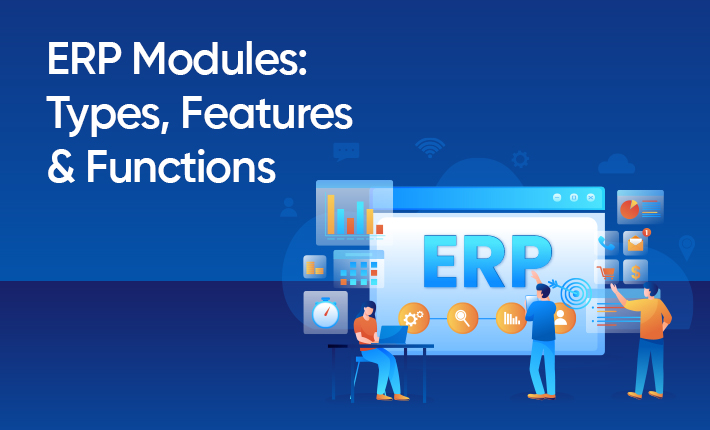In today's business landscape, enterprise resource planning (ERP) systems are essential tools for managing operations. These solutions automate critical business processes and serve as a central repository for all financial and operational data. They comprise modules that help departments, from accounting to human resources to supply chain, carry out their functions.
With an ERP system, all employees can access the information they need to make informed decisions about their department's performance and plan for the future. This single source of information reduces the risk of data inaccuracies and inconsistencies, ensuring that everyone is working with the same data. It also enables better decision-making, leading to more efficient processes and cost savings. In addition, ERP can automate many tasks, reducing errors and freeing up employees to focus on more strategic work.
ERP modules support both back-office and front-office functions such as finance and accounting, procurement, manufacturing, inventory management, order management, warehouse management, supply chain management, customer relationship management (CRM), procurement, and workforce management. More advanced ERP solutions may also include professional services automation (service resource management), human resources management, e-commerce, and marketing automation.
Implementing an ERP solution can bring many benefits to businesses, such as improving collaboration, increasing efficiency, and providing a competitive advantage. With the right ERP system and modules in place, businesses can streamline their operations, reduce costs, and improve their bottom line.
What Are ERP System Modules? 10 ERP Modules and Their Features
ERP (Enterprise Resource Planning) is a software system that integrates different business processes into a unified system, allowing organizations to manage their resources more efficiently. An ERP system typically consists of various modules that correspond to specific business functions. These modules are designed to work together to provide a comprehensive solution for managing an organization's resources. Some of the most common ERP modules are:
Here are 10 common ERP modules and their features:
1. Financial Management: This module deals with the financial aspects of the organization such as accounting, budgeting, financial planning, and cash management.
2. Human Resources Management: This module helps organizations manage employee-related tasks such as payroll, employee benefits, attendance, recruitment, and performance evaluation.
3. Supply Chain Management: This module helps organizations manage the supply chain, including procurement, inventory management, and logistics.
4. Sales and Marketing: This module helps organizations manage their sales and marketing efforts by automating tasks such as lead generation, campaign management, and customer segmentation.
5. Production Planning and Control: This module helps organizations plan and manage their production processes, including scheduling, capacity planning, and materials management.
6. Project Management: This module helps organizations manage their projects, including task allocation, project timelines, and resource management.
7. Quality Management: This module helps organizations manage the quality of their products or services, including quality control, quality assurance, and compliance with industry standards.
8. Customer Relationship Management (CRM): This module helps organizations manage their interactions with customers, including customer data management, sales tracking, and customer service management.
9. Inventory Management: This module helps organizations manage their inventory levels, including tracking stock levels, generating purchase orders, and managing product returns.
10. Business Intelligence and Analytics: This module provides real-time insights into an organization's data, including sales data, production data, and financial data, allowing for better decision-making and performance tracking.
ERP systems can have many more modules depending on the organization's needs and industry, but these ten are common to most ERP systems.
How Do ERP Modules Help Businesses?
ERP (Enterprise Resource Planning) modules help businesses in several ways:
Integration: ERP modules integrate various business functions, including financial management, human resources management, sales, and marketing, supply chain management, production planning, project management, quality management, customer relationship management, inventory management, and business intelligence and analytics. This integration enables businesses to streamline their processes, avoid duplication of efforts, and eliminate data silos.
Standardization: ERP modules provide a standard set of processes, procedures, and best practices that enable businesses to standardize their operations. This standardization helps businesses improve efficiency, reduce errors, and improve the quality of their products and services.
Automation: ERP modules automate routine tasks such as data entry, report generation, and invoice processing. This automation reduces the time and effort required to complete these tasks, freeing up employees to focus on more strategic activities.
Real-time data: ERP modules provide real-time data on various business functions, enabling businesses to monitor their operations and make data-driven decisions. This real-time data helps businesses improve their responsiveness to market changes and customer needs.
Cost savings: ERP modules help businesses reduce costs by eliminating inefficiencies, reducing errors, and improving productivity. This cost savings can be significant, especially for larger organizations with complex operations.
Scalability: ERP modules are designed to be scalable, allowing businesses to add new modules as their needs evolve. This scalability enables businesses to adapt to changing market conditions and customer needs.
In summary, ERP modules help businesses improve efficiency, reduce costs, improve quality, and make data-driven decisions. By providing an integrated solution that standardizes and automates routine tasks, ERP modules enable businesses to focus on strategic activities that drive growth and profitability.
ERP Modules FAQs
Here are some frequently asked questions (FAQs) about ERP modules:
1. What are ERP modules?
ERP modules are components of an ERP system that address specific business functions, such as financial management, supply chain management, inventory management, customer relationship management, human resources management, and manufacturing management.
2. What are the benefits of using ERP modules?
ERP modules can help businesses streamline their operations, improve efficiency, reduce costs, and enhance collaboration among departments. They can also provide real-time insights into business performance, enabling businesses to make informed decisions.
3. Can I customize ERP modules to meet my business needs?
Yes, most ERP systems offer customization options to meet the specific needs of a business. However, customization can be costly and time-consuming, so businesses should carefully consider their requirements before deciding on customization.
4. How do I know which ERP modules I need for my business?
To determine which ERP modules your business needs, you should consider your business size and industry, existing processes, scalability, budget, and user experience. You can also consult with an ERP vendor or consultant for guidance on which modules are necessary for your business.
5. Can I add or remove ERP modules after implementation?
Yes, most ERP systems allow businesses to add or remove modules after implementation. However, adding or removing modules can be costly and time-consuming, and businesses should carefully consider the potential impact on their operations before making changes.

















Post Comments